PreK and Kindergarten
For our youngest learners, we incorporate a developmentally-appropriate curriculum in an all-English learning environment that is fun, safe, and collaborative to help students develop not only academic skills, but also critical thinking, communication, and social skills that build a foundation for students to be successful as they continue on as learners and in life. Our talented educators make thinking and learning an enjoyable endeavor for all types of children by getting to know students as individuals and adapting to their interests and individual needs within a collaborative group setting, which provides opportunities for students to learn not only from their instructor, but also from each other.
Our comprehensive English curriculum is organized into fun, age-appropriate themes and integrates all aspects of early education seamlessly. A theme-based teaching system incorporates a variety of skills and content by centering curriculum focuses around one main topic, allowing in-depth understanding of topics that are interesting and relevant for young learners. We incorporate English into all aspects of the current topic, from fun songs to engaging read-aloud stories to high-interest science experiments and math extensions to art projects. We also build foundational skills for young learners that are developmentally appropriate, such as motor skills like holding a pencil, painting, and basic cutting with scissors, social skills like sharing, playing with others, and chatting with friends, and character development. As our talented team of early childhood teachers notice students become “ready” for certain tasks, we provide appropriately challenging learning opportunities for children to try them out in a positive, safe, nurturing environment.
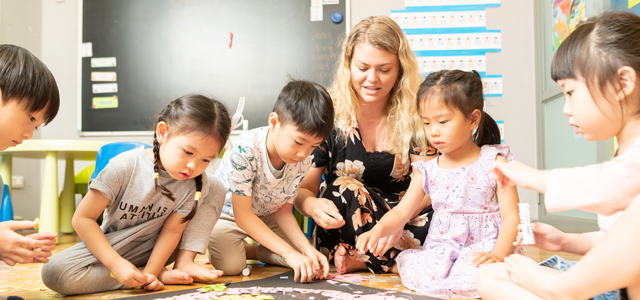
For our earliest learners, we foster a positive student-centered classroom environment focused on providing hands-on learning opportunities while developing oral communication skills in English. As students are just learning how to go to school and make friends, we focus on age-appropriate learning objectives to foster a safe, caring community as students learn a wide range of fundamental skills, such as communicating with one another, sharing, being respectful, taking turns, and developing empathy, in conjunction with basic academic skills, such as listening and following instructions, recognizing the alphabet, discussing stories, and practicing motor skills.
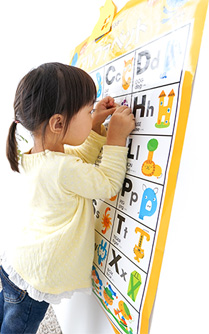
As students progress into our secondary stage of PreK, learning opportunities become progressively more challenging as students develop physically, socially, and academically. Students will continue to learn about age-appropriate themes to develop vocabulary and connect to other academic areas, such as math (numbers and counting), science (simple experiments and making predictions), art, writing, music, and letter recognition as it connects to sounds. Students within our PreK program will begin writing simple words, phrases, and sentences, and they will be introduced to the foundational elements of reading. They also continue to practice collaboration with peers as they learn more about how to engage positively with others.
Our Kindergarten curriculum is designed for students who have a strong foundation of alphabet awareness to dive into the early stages of reading and writing with a theme-based curriculum that supports continual learning of new vocabulary, phonics, reading and writing strategies, and grammar. Students have opportunities for collaborative projects with classmates, 1-on-1 reading time with the teacher, art projects connected to the current topic of focus, practice speaking and presenting to others, and many other chances to practice their language skills in a fun and engaging learning environment.
Levels 1-5
As students transition from our theme-based Kindergarten program into our Reading and Writing Workshop program in Level 1 and through the five levels of our Elementary Program, they are able to utilize the foundation previously established in order to learn with more independence and flexibility. Why is this? The fundamental components of Reading and Writing Workshops rely on a basic English language foundation in listening, speaking, reading, writing, and phonics that allows students to listen and observe an instructor’s modeling of habits of good readers and writers, practice alongside peers, and then apply this learning to their own work independently. This gradual release method of learning is particularly useful in an EFL (English as a Foreign Language) setting in combination with small class sizes, as every child is able to get personalized individual attention, practice language skills through using them to collaborate and communicate with peers, instructors, and eventually larger audiences, and build independence that will help them be successful not only as a student, but also in life.
Students learn to take responsibility for their learning and reflect upon their own learning experiences. They practice setting goals, making self-reflections, and being accountable for their learning, as well as working with others and learning through discussions, peer editing, and a variety of other forms of collaboration.
Teachers introduce reading and writing strategies that students can then apply independently to their own reading and writing. During independent reading and writing sessions, students are given choice and flexibility in what they read and write, leading to ownership of learning for students.
Every student is different. Reading and Writing Workshops embrace each student's individual abilities and provide opportunities for students to improve on important skills.
Students can work at their own pace.
Students are able to share their ideas and work with other students, and consequently students learn from each other.
Students receive a great deal of personalized feedback during conferences with the instructor, which enables them to target specific areas of growth. They also practice giving and receiving feedback from peers, which helps to foster a strong classroom community in which all students support the learning of everyone.
Students are able to develop critical thinking skills not only through their individual tasks, but also during in-depth discussions and collaboration with classmates.
At the end of each unit, students “celebrate” the learning of everyone in the classroom community, which helps to motivate students to get ready to learn more! These are also often great opportunities for us to invite parents and family members to come in and join the class for a publishing party and celebration of all of their learning from the unit, which helps families understand what students have learned. This also fosters a positive school community with parents, students, teachers, and other members of our school, which further supports students on their learning journey.
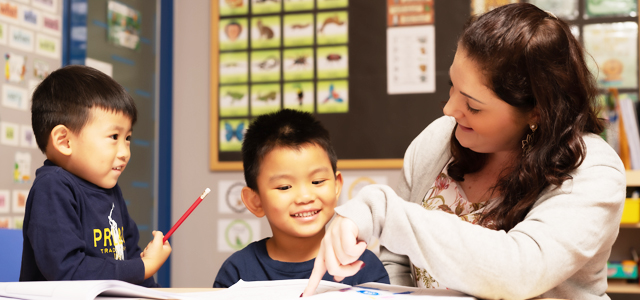
As students move from our theme-based PreK and Kindergarten curricula into our Level 1 curriculum, teachers support learners as they develop greater independence in reading and writing. At this level, we utilize Reading and Writing Workshops, teach students reading and writing strategies, provide guided practice with peers, and later give them a chance to try these strategies out independently on books at their own “just-right” reading levels or, in writing, on work that has been crafted out of individual student choice. We develop foundational writing skills by teaching the entire writing process, from brainstorming and drafting through editing, revising, and publishing. Grammar and phonics skills are integrated into teaching to support students’ reading, writing, listening, and speaking, and these are consistently included throughout our units from Level 1 through Level 5 at progressively more challenging levels.
While the basic structures of the Reading and Writing Workshops stay the same in Level 2, students move to progressively more challenging and complex work as readers and writers. With the foundational skills they developed in their first year of the Workshops, writers are now able to utilize the steps of the writing process to push their work to new heights as they explore new genres and dive deeper into familiar types of writing, such as personal narratives. Readers build off of their previous repertoire of reading strategies in order to engage with more challenging texts, expand their vocabulary, and grow their thinking in new ways.
By the time students reach our Level 3 program, they have a comfortable grasp with how to work within the workshop structures, as well as how to balance full-class instruction with group work, pair work, and independent reading and writing. Students are introduced to new genres of reading and writing, such as poetry and introductory literary analysis essays, while also expanding their understandings of previous genres in order to apply their ideas in more rigorous contexts. Additionally, as students are reintroduced to working with peers in book clubs, they have opportunities to try leadership roles within these clubs in order to further develop their communication and collaboration skills.
When transitioning from Level 3 to Level 4, it is important to note some key differences between 3rd and 4th grade standards for English Language Arts. On the surface, it may appear that students are learning similar genres of reading and writing, yet by Level 4, students are being challenged to think far beyond surface-level reading and writing strategies. They are critically analyzing purposes for why authors include certain characters or events, word choice in literature, transitional words that add different shades of meaning to their own writing, and much more. Students are introduced to new genres of reading and writing, such as analyzing literature while reading and formulating strong interpretative literary essays. Simultaneously, students dive deeper into their work with book clubs, and with fiction and nonfiction reading and writing to elevate the level of their work in all aspects of English Language Arts.
In the final level of our Elementary Program, students are pushed to new heights as readers, writers, and communicators. Not only are they challenged to stretch the length of their writing, their stamina as readers, and much more, but they also have opportunities for new forms of public speaking by using research to back up their assertions. Students continue to build on key thinking skills that are introduced through all of our programs, as we push learners to think thoroughly and demonstrate their thinking through conversations, collaboration, projects, reflections, and other learning tools. To complete their time in the Elementary Program, they write memoirs that provide not only wonderful snapshots of themselves at their current stage in life, but also offer a terrific chance to look back at all their learning throughout their elementary years!
Middle School Levels (6-8)
Students entering our Middle School Program will learn how to transfer thinking techniques and tools, collaborative abilities, and academic skills they have already developed in our Elementary Program to a more rigorous program. In the Middle School Levels, students will build on their existing language abilities and learn new strategies and skills that will help them be successful in future studies, first in our High School Program, then later in universities overseas and future employment, both in Taiwan and internationally. At these stages, we teach students the power of language and their words to understand how important these can be in impacting change in the world. Students practice reading a range of texts from poetry to nonfiction work as they learn and implement new reading strategies for these increasingly complex texts. They will learn to discuss and question what they have read with peers, read extensively about a topic to craft their own opinion essays and in-depth research papers, practice how to appropriately cite sources, and learn how to make their writing compelling for readers, whether they are writing a persuasive essay on the merits of year-round schools, examining the author’s purpose and bias as they link to key themes in a literary essay, or evoking emotion with a touching personal narrative. Additionally, they will have opportunities to collaborate with peers in small groups through discussions, debates, student-led book clubs, presentations, and publishing parties, which are all vitally important components of English language learning, as communicating effectively with others is one of the primary reasons to learn a language and will help students in any future endeavors they pursue in which they will use English. All of the skills and habits that students develop throughout the Middle School Program have a direct impact on their readiness for the rigor and challenges of first high school, and later university, programs taught in English.
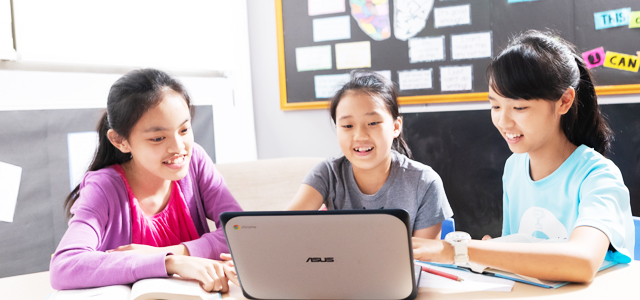
Beginning in Level 6, students actively participate in a classroom community of readers and writers in their Reading and Writing Workshops, and as they move towards greater independence, they begin leading these communities more often. Students in Level 6 have opportunities to discuss themes, characters, craft, and theories about stories and nonfiction texts they are reading with the reading community, and they practice sharing their ideas, building off others’ thoughts, and making adjustments to their thinking through the meaningful conversations taking place in the Reading Workshops. As writers, students build on their foundations from the Elementary Levels to refine their writing as they explore new uses for their writing, such as making and supporting a claim, writing a literary essay exploring theories on characters, and writing about cause and effect. By building a strong classroom community of learners, students learn from not only the instructor, but also peers, and in turn, this community supports the individual needs of each learner.
Level 7 supports learners as they adjust to greater independence, grow their confidence, and develop self-reliance within their community of readers and writers by providing more rigor and challenges to students. As readers, Level 7 students follow plotlines to track development of characters and the story, discuss internal and external conflicts, understand the importance of the point of view of characters and narrators, and further explore how authors craft literature and expository works. Level 7 writers try their own hand at demonstrating literary elements in their own writing, such as mood, tone, and methods for evoking emotion in readers. Additionally, students have opportunities to practice methods of research and write their own argumentative and informational essays on topics of their choosing. In addition to working with peers on reading and writing, students have opportunities to work in groups to craft presentations and practice the important skills of public speaking and collaboration throughout the year.
In the final level of our Middle School program, students continue to build upon their repertoire of language and literacy skills to push their reading and writing to new heights. The classroom community of readers practice sharing, critiquing, and analyzing different types of texts, exploring how word choice impacts an author’s message, monitoring rising and falling action in stories, and immersing themselves in literature from a chosen historical time period to practice comparing and contrasting texts, analyzing elements of literature like tension, irony, and humor, and continue to build their vocabulary in preparation for the High School program in Level 9. The writing community fine-tunes the writing craft through a range of genres, like poetry, commentaries on social issues, and literary essays that tie together multiple elements of literature. By the time students complete this level, they are prepared for the additional upcoming challenges of the High School program, not only with their foundational skills as readers, writers, listeners, and speakers, but also in their abilities to think deeply, take charge of their own learning, and collaborate effectively with others.
High School Levels (9-12)
Throughout the progression of all of the levels at our school, we are building skills, dispositions, and habits of learners to ensure they are prepared for the rigor and challenges of the High School Program, which is the final stage in their preparation for university and their entry into the professional world. With the goal of helping students be ready for university and future employment either in Taiwan or overseas, we provide students with a well-rounded learning experience throughout Levels 9 to 12 that builds a number of traits that will help them throughout life. As readers and writers, they will understand the full power and potential of words as they learn how to hone their existing language skills while developing new ones to analyze the world of texts through a critical lens and construct their own essays, stories, poems, and presentations for audiences on a larger scale. In addition, we incorporate grammar and vocabulary practice in our lessons to improve upon reading and writing, as well as provide a foundation for students to understand the structures and methods of analyzing questions such as those that appear on the SAT and ACT exams. The main goal of the High School program is to prepare students for the academic world and the “real world” beyond their time at our school, where they will become contributing members of society and global citizens that help to shape the future.
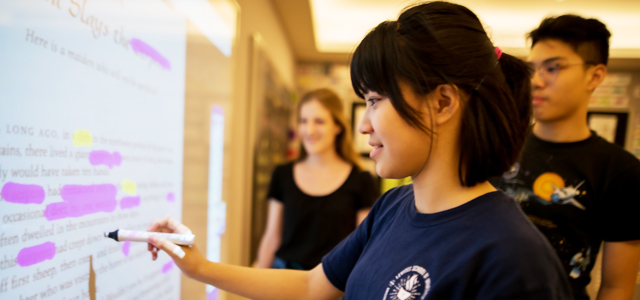
As students begin our High School Program, they draw from their experiences in previous levels and utilize these flexibly as they add more skills and strategies to their repertoire and become more independent learners. As readers, students analyze not only what is written in a text, but choices the authors have made. In both fiction and nonfiction reading, students practice reading texts of various lengths, including short stories, articles, and novels, and dive deeper into the author’s purpose, overarching themes about characters, word choice, and underlying messages from texts and writers. As writers, students practice many of the elements they analyzed in reading as they write a variety of text types, ranging from literary essays and personal narratives to research papers and argumentative essays. A key component of high school learning is to practice thinking and stretching students’ thinking through deep conversations with others about a range of texts and topics. Students prepare to make claims and back them up through evidence and facts as they learn to influence an audience, but they also learn how to think in new ways that help them grow as students and young adults.
In Level 10, teachers and peers continue to push the thinking of each student as they dive deeper into English literature and language. Students develop critical thinking skills as they examine texts, debate and discuss with classmates, and form theories about big ideas in the world around them. They compare and contrast texts across cultures to grow bigger ideas and wonderings about universal questions, all while practicing the skills of summarizing, understanding themes and key ideas, and developing vocabulary. As learners develop their own writing style and voice, they draw from all they learn to make decisions about their own learning, such as topics they wish to examine further for research, texts within certain genres that they wish to delve into, and methods of presentation they choose to tackle as they share their own learning with others. While students support one another through the learning process, teachers continue to work with groups and individuals to further push students’ thinking and develop their communication skills in ways that will benefit them throughout high school and in the future.
By the second half of our High School Program, learners are being pushed in a number of ways with long-term benefits. They tackle more challenging and longer texts, often of their own choice, in order to familiarize themselves with different topics and writing styles, develop fluency, and increase their own reading volume, which will benefit them as they prepare for the dense reading of university as well as helping them to form good reading habits to become lifelong readers (and learners). Simultaneously, students collaborate with peers and participate in activities and discussions that help build their confidence and provide them with much-needed opportunities to share their ideas with others. Students analyze, discuss, and write about complex topics and themes, which will prepare them for future discourse in any field of study they choose.
In the final year of our program, students have the opportunity to explore social issues that are relevant to their community and their own lives in preparation for their future as global citizens. Through a range of genres, including poetry, plays, informational texts, and narrative pieces, students develop well-rounded views on topics of interest from many perspectives. The purpose of this is to help students understand how to critically examine the validity and perspectives of authors’ work, conduct independent research, and connect learning to current events, other texts, and students’ own experiences to bring all they have learned throughout their time with us to a close, which is not an ending point, but a chance for students to leave our school, confident in their own abilities and ready to make their mark on the world!
Special Topics Classes
Due to the limited time available for us to spend with our students as an after-school program, we provide additional opportunities to practice even more aspects of English in a fun setting while incorporating a wider range of topics during Special Topics Classes. These might be summer camp classes, winter camp classes, or classes that supplement our regularly scheduled English language arts classes. Special Topics Classes are 3 hours long each day. During Special Topics Classes, we add STEM (Science, Technology, Engineering, Math) components, such as Lego Education, coding, and a wide range of other STEM-based activities, art projects, project-based learning opportunities, and much more to a curriculum that still includes regular classroom discussions, peer collaboration, public speaking, reading, and writing. These classes not only develop multiple components of students’ English language skills by providing opportunities to learn new vocabulary, such as the language of hypotheses, experiments, and other science-based language, but also to gain confidence by getting to demonstrate their understanding through doing more, like collaborative problem-solving with peers to come up with a new method of tackling a real-world problem. Students get to learn a lot while having a fun time learning about topics that are new to them, all in English! For students to try these programs out during summer or winter camp, it is also a great opportunity to get to join our school community and see how much fun learning English can be!
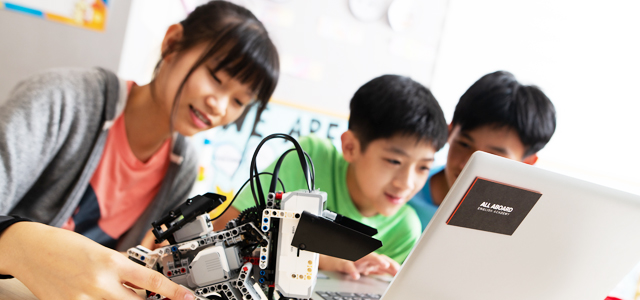
During students’ breaks from their busy schedules at their daytime schools, we offer intensive summer and winter camp classes. The schedules of these classes are announced in advance, but vary based on the year. Winter camp classes are offered in one-week blocks, with classes from Monday through Friday for the week. Classes are offered in half-day sessions in the morning (9am - 12noon) or afternoon (1pm - 4pm), and students are welcome to enroll in one or both. Classes focus on a theme and include a wide range of learning opportunities based on the topic, including STEM (science, technology, engineering, math) activities, art projects, creative writing, engaging readings, drama, project-based learning, and much more. Students also practice collaboration, communication, and creative problem-solving regularly throughout the class.
For students who are ready to dive into STEAM classes as a supplement to their regularly scheduled English language arts classes, we offer ongoing STEAM-based classes throughout the school year. During these classes, students engage in STEAM activities while practicing their English language skills, working with peers, engaging in creative problem-solving, and reflecting on their creations and the STEAM process.